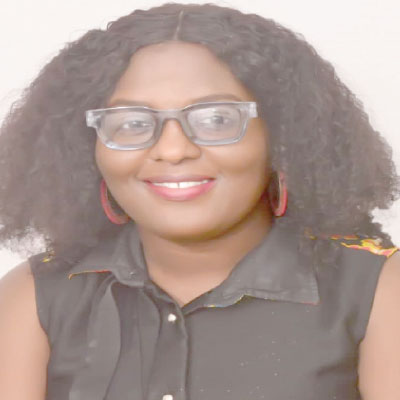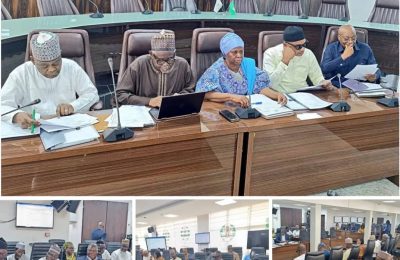
Ajiboye Fadeke is a pharmacist with the University College Hospital (UCH), Ibadan. She is also the founder of Arikare Foundation. In this interview by Awau Adegoke, she speaks about her work in community health interventions.
How did Arikcare Foundation come to be?

There are many experiences because I work in a tertiary healthcare institution. However, those that are personal to me happened to be my father’s elder sister and a Mrs X in my church.
Mrs X is an elder and very active, but we lost her to death. We were told she suddenly developed severe headache and dizziness, and was quickly rushed to the hospital. Upon arrival, her blood pressure was critically high at 220/130mmHg and was diagnosed with hypertensive crisis. The attending physician decided to administer hydralazine IV to lower the B.P, due to the urgency of the situation. Shortly after the administration of hydralazine, the blood pressure dropped precipitously with loss of consciousness and later she was pronounced dead. It was a big blow to me. This was the first out of many cases that I know. I know of people suffering from stroke, cancer, cardiovascular diseases or diabetes because of a lack of information on health-related issues, even sudden deaths to some folks that can still be alive today.
The second case that is still painful anytime I remember it happened to my father’s elder sister. I wasn’t told she had raised B.P. There was a particular day she went to the farm and suddenly felt a severe headache, followed by weakness on the right side of her body and difficulty speaking. We lost her three years ago. These are what prompted me to start this foundation. It is my little way of contributing to society. The vision of Arikcare Foundation has been within me since 10 years ago. Before that time, we have been giving lectures and attending to people in rural and urban communities.
What were some common undiagnosed health conditions you encountered in communities Arikcare has worked?
These diseases include cardiovascular disease, hypertension, stroke, diabetes, particularly type 2 diabetes — some have even started developing diabetes foot. Maternal health issues too, like hypertension in pregnancy, which can lead to high rates of maternal and infant mortality. Others are skin diseases, fungi infections, peptic ulcers, chronic pain conditions, arthritis, vitamin and mineral deficiency, micronutrient deficiencies, oral health problems, etc.
Then male infertility. There was a particular case of a married couple of over five years with no offspring and the man had put all the blame on the woman. Meanwhile, after undergoing the test recommended for him, it was discovered that he was suffering from azoospermia (no sperm count).
These undiagnosed and untreated conditions highlight the need for comprehensive healthcare initiatives in Nigeria.
Are strategies for bringing about increased awareness of these diseases working?
I can say that some that we have implemented, it has started yielding positive outcomes. We are getting good results. There are some cases we encountered that we don’t have facilities for. So, for these cases, we refer them to the hospital. However, in some rural areas, some patients are very poor. So, it’s the little that we offer them that they make use of and these are not enough to give them an effective therapeutic regimen. However, we have implemented mobile pharmacy consultancy and outreach programmes that have increased access to medical care, health education, and improved overall health outcomes.
Do you partner with healthcare providers to improve access to medical care, especially for underserved communities?
This organisation doesn’t work alone. Mostly, we worked with other health professionals, like pharmacists, doctors, nurses, and dentists. Some of these health professionals have extensive experience in health promotion, particularly in areas like HIV/AIDS, fertility, maternal and child health, and different ailments and diseases.
We have written proposals to the Oyo State Ministry of Health and foreign agencies. We are hoping to get help from them.
What are the challenges you encounter in achieving the foundation’s mission?
Running the NGO’s programmes is not easy and can be stressful. The driving force behind it is the passion I have for it.
Some of the challenges are funding and sponsorship. I am always sad when I meet some people with some conditions and won’t be able to do much for them because of a lack of resources. Community trust and engagement is another challenge: Most times, convincing some chiefs and elders in some communities can be challenging, because we are seen as outsiders
Another problem is getting the amount of workers to join the movement. I we need to recruit more staff for this purpose by implementing training and capacity building programmes to develop some local talents even though we still need some external expertise there will be a reduction in total reliance on them. Another thing that can be done to attract and retain our skilled workers is through incentives — and, this is still about getting enough money to fund the foundation.
To tackle the problem of funding, we are trying to develop multiple funding and partnerships, and seeking sponsorship. We want to focus on securing long-term grants and building relationships with funders to ensure sustained financial support.
For the community issues, we need to work closely, especially with some community leaders and influencers who have little knowledge of health to gain their support on time. We can even educate some of the community leaders first before the main programme on the benefits of the health interventions.
How do you measure and evaluate the impact of your foundation or work?
We have specific goals and clear objectives we follow to achieve our aims. Sometimes, we have changes in objectives, depending on the previous encounters we had from initial visitations. We have been to a community and discovered that some people were using the wrong drugs for ailments. For example, prednisolone is used for asthmatic patients ─ cough is one of the symptoms of asthma. The patient collected the drug from this asthmatic patient, thinking it was for a cough. Meanwhile, her cough is an ordinary cough. We witnessed many cases like that, and we enlightened them on the dangers of such practices.
We use appropriate data collection, using quantitative methods, to collect numerical data such as the number of patients treated and the type of diseases encountered to gather information on the prevalence of the diseases and how to seek the best treatment for them.
We can evaluate impact by conducting a formal evaluation at the end of the project. This would be done by comparing health outcomes in intervention vs. non-intervention communities.
We can compile impact reports that summarise the findings, highlighting both successes and areas for improvement like case studies to make the reports more engaging and share the reports with agencies, international donor organisations, individuals, governments, and others who are ready to help.
We will solicit feedback from the community on the findings and the overall impact of the project. This can help in refining future interventions. Based on the evaluation, we can make necessary adjustments to such interventions to improve effectiveness.
What is your experience with funding?
Securing funding for the foundation can be very difficult. Funding has limited us from widening our horizons as it is meant to be. Local funding is often less available and some individuals have strict requirements regarding how funds should be used, including detailed reporting and compliance with their standards, which can be burdensome. Anyway, we are working on getting bigger grants. It is important to build capacity for financial management and reporting, which can enhance the foundation’s credibility.
Navigating our relationship with government bodies can be complex, especially since there is political instability. We have to talk to many government officials and, most of the time, may not get positive results, which has been discouraging.
Are there specific roles for government in your work? How much of your work or findings do you report to government?
Yes, there are roles the government plays in our work if they can align with us. For example, the government can help to facilitate the foundation through access to essential resources such as medical supplies, drugs, medical devices, and even health facilities.
If we can get a partnership with the government, they can help to raise public awareness and educate the population on health issues, preventive measures, and available health services. The collaborative effort helps amplify the reach and impact of health campaigns. They can help through capacity-building initiatives, such as training technical associates and provision of necessary resources to improve efficiency and effectiveness. Even though we are still independent, the government may provide financial support through grants or subsidies to our foundation, especially when working on critical health issues.
Some of the findings reported to relevant government agencies were patterns of prevalence of diseases like tuberculosis, HIV, hypertension, and diabetes. Some remote or rural communities have limited access to healthcare facilities leading to delay or inadequate treatment. Many of them lack health insurance schemes, which we have tried to introduce to them, but poverty is a significant barrier to achieving good health.
This information was available in some of the reports submitted to the government.
Are you satisfied with the government’s response to your endeavours?
No, I am not satisfied at all. In some cases, when we report critical health issues, such as outbreaks of diseases or severe malnutrition in underserved areas, the government may fail to take prompt action. This neglect can be due to political instability within the government, leading to delays in addressing urgent health needs.
We face different complex situations, and by the time we submit our proposal for help, there is always a delay in response, which most of the time, is not favourable. Inefficient communication to the right channels leads to delays in information sharing and a lack of coordinated response to our foundation.
But, I pray something positive will come forth to move the foundation forward.
How do you think the government can improve on this?
The government should be able to create effective, dedicated liaison offices because I noticed that there were different offices we needed to visit to tender our proposal. But, if there is a liaison office to facilitate communication and coordination with the foundation, it will help streamline interactions and reduce delays.
If there is a way the government can hold regular meetings — that is, government officials with different foundations — to discuss ongoing health issues, share findings and plan joint responses, it would foster collaboration and ensure all parties are aligned on priorities and strategies.
READ ALSO: EFCC returns 53 stolen vehicles, $180,300 to Canadian authorities








